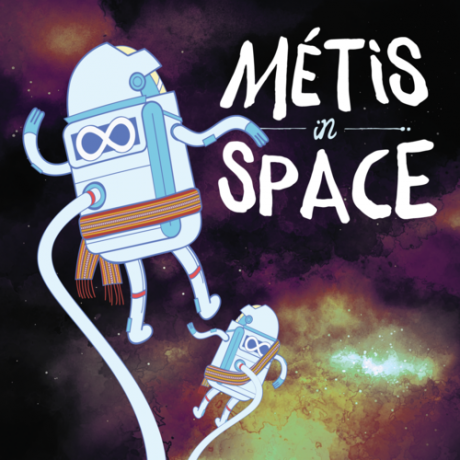Arts
You are here
Métis in Space: bringing decolonization to the far reaches of the universe

March 28, 2015
Indigenous stereotypes, racism, and sexism may reach distant planets long before human beings do. Broadcasts of our favourite science fiction shows and movies are continuously sent out into the universe, along with their oppressive messages; but there is hope. Enter Métis in Space, where our heroines analyze their favourite science fiction shows, and broadcast their analysis through hilarious yet critical podcasts.
In one of their latest episodes, the movie Cowboys and Aliens seems like the worst-case scenario. The movie starts with characters carrying a bunch of scalps. Even the main characters are just oozing with racism and misogyny. It is assumed that most women in this movie are sex workers, and characters take pride in being “Indian killers.” Meanwhile Adam Beach, the one clearly Indigenous actor in this movie, is basically treated like a slave for the white cowboys, and has a mystical ability to track aliens.
In one of the earlier podcasts of Métis in Space, they examine the Star Trek episode, “The Paradise Syndrome.” In this episode Captain Kirk lands from the sky onto a planet with Indigenous-like inhabitants and pristine natural habitat. The inhabitants think Kirk is a god; a white god that demonstrates superior technology, as Indigenous women bow down to him. They do give a nod to Star Trek by noting that not all their episodes were like this. The budget of Star Trek was slashed in season three, and many of the good writers left. Star Trek is known for being pretty progressive in terms of race. In this episode colonial stereotypes are horrifyingly obvious, but at the same time these space-wise Métis make it pretty hilarious. Kirk basically takes over a culture by falling into a machine and building a lamp; it’s hard not to poke fun at that.
It’s important to realize that these women actually enjoy science fiction. The idea behind the podcasts is to give themselves and the rest of us an awareness of how these themes come up all the time in science fiction. Later in season two Molly and Chelsea plan to reclaim science fiction by exploring what an Indigenous future could look like 300 years from now.
The best thing about these podcasts is Molly and Chelsea’s use of humour, and their refusal to be bound by stereotypes and sexist ideals. In the beginning of each episode in the first season they start by opening up a bottle of wine that usually has some tie-in with the show; like The Patriarch, or a western wine for a western themed show. Some listeners raised arguments against drinking the wine, claiming it perpetuated stereotypes. But rather than bow to the pressure, Molly and Chelsea rightfully pointed out that this would never come up were it a non-native show. Instead, they chose to model responsible social drinking and challenged stereotypes that Indigenous people can’t handle alcohol.
As the show evolved in season two, there was less drinking, only because Chelsea is pregnant. The fact that they can speak about her pregnancy so openly right at the beginning of the season reflects their commitment to bring feminism into the podcast; Chelsea often refers to her experiences as a mother in the show. They also encourage others to start their own podcasts and continue to use this tool against oppression.
Ultimately Métis in Space is a satirical look at the limitations of Western conceptions of the future, and our inability to see Indigenous people as part of that future.
So if you find yourself getting caught up in the belief that the Earth can’t heal from what you do after watching Supernatural, or start thinking that Indigenous people couldn’t build their own monuments after watching an alien conspiracy show, it’s time to tune in. Métis in Space to the rescue! You can find their podcasts at http://www.indianandcowboy.com/metis-in-space-podcast/
If you like this article register for Rage Against the System, a weekend conference of ideas to change the world, April 24-26 in Toronto. Sessions include "Colonialism and Indigenous resistance" and "Nuit Rouge: art and revolution."
Section:










